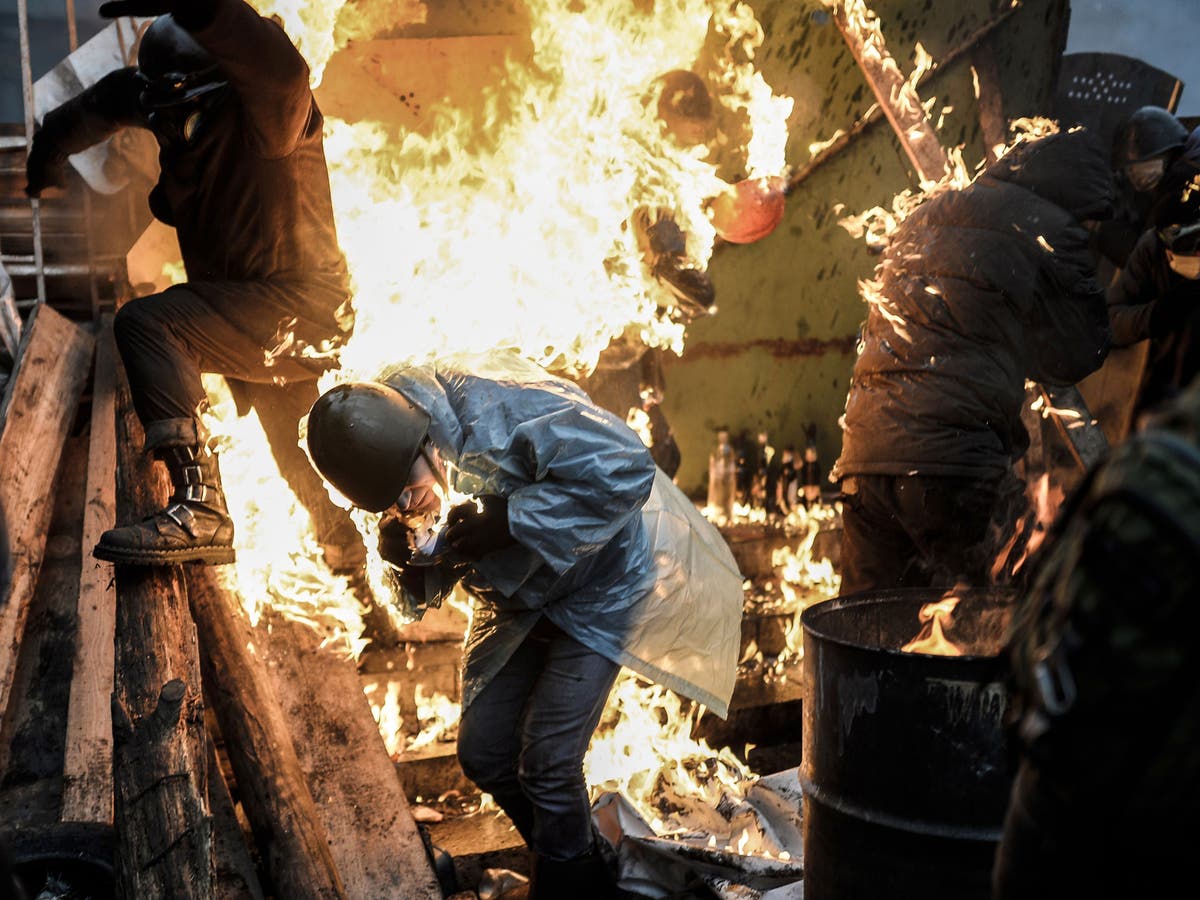
The Russia-Ukraine War and the Climate Crisis
Dr Stuart Parkinson / Scientists for Global Responsibility
(June 11, 2022) — Dr. Stuart Parkinson summarises the ways in which the Russia-Ukraine war is fuelling climate change both on and off the battlefield — putting the 1.5C temperature target in jeopardy.
This PowerPoint presentation was given at a meeting of European Network Against Arms Trade campaigners on 11 June.
Direct Effects on Carbon Emissions
- Before war: Russia 3.1% of world military spending; Ukraine 0.3%
- War is increasing military carbon emissions
• Large increases in oil consumption of military vehicles
• Large increases in production of military equipment
• Some increases in energy consumption on military bases - Carbon emissions due to destruction/ damage to buildings, land • Fires of combustible materials in cities, esp. fuel depots
• Burning/ damage to forests and other ecosystems
• Degradation of soils - Very little data available
- Military spending stats from SIPRI (2022)
- Combat planes have especially high fuel consumption
- Fuel consumption for all vehicles increases substantially during ‘combat operations’
- Large fraction of military production taking place in NATO countries
- Data – before war, no publicly available data on Russian military carbon emissions, partial/ unclear data on Ukraine
- Examples of available data, including from other wars/ militaries:
- Peace‐time fuel consumption of US armoured vehicle is about 10 times that of average car; for US combat plane, it is about 100 times larger; in war‐time, this grows considerably (Parkinson, 2020)
- When Donbas war begin in 2014, incomplete data indicates Ukraine military carbon emissions rose 400% in 1y (UN FCCC, 2021)
- As ‘Global War on Terrorism’ ramped up, more complete data shows US military emissions rose by 35% in 4y up to 2004 (Crawford, 2019)
- US data from the Iraq war shows that military equipment was used at between 6 and 10 times the peace‐time rate (Stiglitz and Bilmes, 2009: 42)

Pollution from conflict will poison Ukraine for generations.
Indirect Effects on Carbon Emissions
- Major increases in military spending in NATO countries
- Germany announced €100bn rise in military spending – 60% larger than entire annual military budget of Russia
- Military spending is carbon intensive
- Increases in oil & gas prices
• Increases in oil & gas production outside Russia • Improvements in energy efficiency
• Increases in renewable energy production - Reconstruction (post‐war); increased health care for injured • Lower political priority for international climate action
• Indirect effects likely to be larger - In 2021, NATO military spending was over 55% of global total (SIPRI, 2022)
- By end of March 2022, at least eight NATO countries had announced plans to increase military spending (SIPRI, 2022) with Germany announcing €100bn increase (The Guardian, 2022)
- Carbon emissions from reconstruction will be especially high if high‐carbon concrete used
- Increased health care for injured veterans, civilians, refugees

Energy Policy Changes So Far
- Some positive steps on energy efficiency and renewables
- In general, negative policies dwarf positive policies
- Research just published: Climate Action Tracker (2022)
- Changes in energy policy alone could put Paris target of 1.5C out of reach

Don’t Forget threat of Nuclear War…
- Russia has made nuclear threats – NATO has 3 nuclear‐armed members
- Nuclear war can cause catastrophic climate change through ‘nuclear winter’ effect
- Multiple nuclear explosions can lead to intense ‘fire‐storms’
• Smoke injected high into atmosphere above rain clouds
• Spreads out, blocking Sun’s rays
• Catastrophic cooling ® crop failures etc ® mass starvation etc. - Nuclear winter effects can be caused by:
About 100 Hiroshima‐sized weapons
• About 40 UK Trident weapons - For more discussion of the recent research, see: Nature (2020); SGR (2015)

Campaign Work
- Raise awareness of how militaries and war fuel climate crisis • Russia‐Ukraine war is key threat to 1.5°C target
- Support climate campaigners on green policies
- Support anti‐nuclear campaigners on disarmament policies
- Lobbying on climate & military:
• Improved data reporting on carbon emissions from militaries/ war • Military emissions in national carbon reduction targets
• Target UN climate bodies, especially UN FCCC Secretariat and IPCC • New report out on 20th June on lobbying - https://transformdefence.org/publication/
- Scientists for Global Responsibility military & climate outputs:
• https://www.sgr.org.uk/projects/climate‐change‐military‐main‐outputs
References
- Climate Action Tracker (2022). Global reaction to energy crisis risks zero carbon transition.
- https://climateactiontracker.org/publications/global‐reaction‐to‐energy‐crisis‐risks‐zero‐carbon‐transition/
- Crawford N (2019). Pentagon Fuel Use, Climate Change, and the Costs of War. Brown University, USA.
- https://watson.brown.edu/costsofwar/papers/ClimateChangeandCostofWar
- The Guardian (2022). Germany to set up €100bn fund to boost its military strength. 27 February.
- https://www.theguardian.com/world/2022/feb/27/germany‐set‐up‐fund‐boost‐military‐strength‐ukraine‐putin
- Nature (2020). How a small nuclear war would transform the entire planet.
- https://www.nature.com/articles/d41586‐020‐00794‐y
- Parkinson S (2020). The carbon boot‐print of the military. Responsible Science, no.2.
- https://www.sgr.org.uk/resources/carbon‐boot‐print‐military‐0
- SGR (2015). UK nuclear weapons: a catastrophe in the making?
- https://www.sgr.org.uk/publications/uk‐nuclear‐weapons‐catastrophe‐making
- SIPRI (2022). Trends in World Military Expenditure, 2021.
- https://www.sipri.org/publications/2022/sipri‐fact‐sheets/trends‐world‐military‐expenditure‐2021
- Stiglitz J, Bilmes L (2009). The Three Trillion Dollar War. Penguin, UK.
- UN FCCC (2021). Greenhouse Gas Inventory Data ‐ Detailed data by Party. https://di.unfccc.int/detailed_data_by_party (Search terms: Ukraine; all years; 1.A.5 other; aggregate GHGs; kt CO2e)